#Rhetoric of unity
Explore tagged Tumblr posts
Text
another thing that I think would fix 50% of queer infighting overnight: if people understood what "invisibility" actually Means.
people see "this oppressed group has a problem with invisibility" and assume it just means "nobody knows what this oppressed group is," and Then assume "so nobody targets this oppressed group for Being an oppressed group."
when what "invisibility" Actually means is that when this oppressed group faces violence, that violence is swept under the rug (either by being misreported, or not reported at all).
the point of fighting back against invisibility is about allowing people to speak up about the oppression they Already Face and actually be Heard. which can then be used to help people get the support that they need.
so when someone says "this group doesn't experience violence Because all they face is invisibility" they are Actively participating in that invisibility, which then perpetuates that violence by allowing it to continue unseen.
which, of course, gets even Worse when people use this misunderstanding as an excuse to be actively violent towards other community members. to Actively try to suppress other people's voices because of this perception that they must Have It Better because the violence they face is, well, Invisible.
#queer unity#trans unity#and I'm using “this group” because I can list off a dozen different kinds of queer people I've seen this rhetoric used against#just off the top of my head right now
2K notes
·
View notes
Text
ive been worrying a lot lately (mostly pointlessly) about how can i believe anything anyone says is accurate if there's no such thing as an objective view of the world (like... in theory the world exists objectively, but every time we see and describe it we're only describing our interpretation of it no matter how objective we try to be, and sometimes our perspective can be really flawed without us realizing, like when i was 5 and everyone said my bike was tiny but i literally couldn't see the difference in size between my bike and theirs until i was older and had a bigger bike)
and the thing that gave me the most comfort weirdly was that beauty is something that is always 100% subjective. so if i think something is beautiful, it really is 100% for sure beautiful because i think it is. and for someone else that thing could be ugly or meaningless but that's okay because beauty is subjective.
#it's weird crisis time!!! well post-weird-crisis time. i'm okay now#in case it's not clear im not talking about beauty as in personal appearance exclusively#i mean beauty as in everything beautiful. which is a lot of things#i think ive been listening to too many podcasts about cults lately#but also it's making me insane to see people who are leftists using the exact same arguments against the right as they are against us#i can't take this 'they want you dead' rhetoric anymore. i don't care how true it is. they are saying the same things about us#we need communication and trust building and unity
5 notes
·
View notes
Text
Delving into Poetic Wisdom: A Review of "On the Art of Poetry" by Aristotle
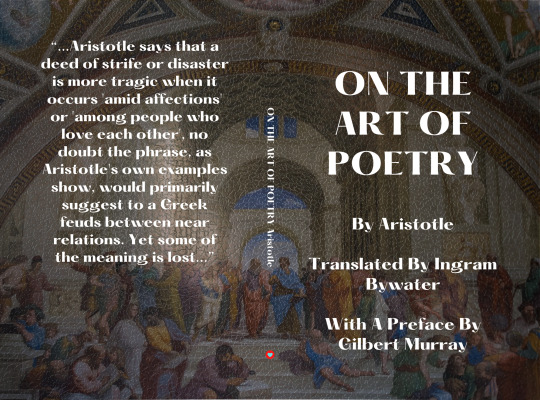
Aristotle's "On the Art of Poetry," translated by Ingram Bywater, stands as a seminal work in literary criticism, offering profound insights into the nature and function of poetry that continue to resonate with readers and scholars alike. Written in the 4th century BCE, this treatise serves as a comprehensive examination of the principles and techniques that underlie the creation of poetry, providing valuable guidance for poets and readers alike.
At its core, "On the Art of Poetry" is a testament to Aristotle's keen intellect and analytical prowess. In this work, Aristotle explores the various elements that contribute to the effectiveness of poetry, including plot, character, diction, and spectacle. Through his systematic analysis, Aristotle seeks to uncover the universal principles that govern the art of poetry, shedding light on its essential nature and its role in human society.
One of the most compelling aspects of "On the Art of Poetry" is Aristotle's emphasis on the importance of mimesis, or imitation, in poetry. According to Aristotle, poetry is a form of imitation that seeks to represent the actions, emotions, and experiences of human life. Through the skillful use of language and imagery, poets are able to create a vivid and lifelike portrayal of the world, inviting readers to engage with their work on a profound emotional and intellectual level.
Moreover, "On the Art of Poetry" offers valuable insights into the principles of dramatic structure and the role of catharsis in tragedy. Aristotle argues that tragedy is a form of poetry that evokes feelings of pity and fear in the audience, leading to a purgation or cleansing of these emotions. Through the depiction of the fall of a tragic hero, tragedy allows audiences to confront their own mortality and the fragility of human existence, ultimately leading to a deeper understanding of the human condition.
In addition to its exploration of tragedy, "On the Art of Poetry" also examines the principles of comedy and epic poetry, providing valuable guidance for poets working in these genres. Aristotle discusses the importance of unity of plot, character, and theme in epic poetry, as well as the role of humor and satire in comedy. Through his analysis, Aristotle highlights the diversity of poetic forms and the unique challenges and opportunities that each genre presents to the poet.
In conclusion, "On the Art of Poetry" by Aristotle is a timeless classic that continues to inspire and enlighten readers with its profound insights into the nature of poetry. Aristotle's systematic approach to literary criticism, coupled with his keen observations and analytical rigor, make this work an indispensable resource for anyone interested in the art of poetry. With its timeless wisdom and enduring relevance, "On the Art of Poetry" remains a cornerstone of literary theory and a testament to the enduring power of poetic expression.
Aristotle's "On the Art of Poetry," is available in Amazon in paperback 12.99$ and hardcover 18.99$ editions.
Number of pages: 116
Language: English
Rating: 10/10
Link of the book!
Review By: King's Cat
#Aristotle#Poetry#Literary criticism#Mimesis#Imitation#Dramatic structure#Tragedy#Catharsis#Comedy#Epic poetry#Unity of plot#Characterization#Diction#Spectacle#Poetics#Aesthetic principles#Greek literature#Philosophical discourse#Aristotle's theory#Literary analysis#Poetic form#Emotion#Human experience#Morality#Ethics#Aesthetics#Universal principles#Literary genres#Rhetoric#Imagination
3 notes
·
View notes
Text
The History Behind the Memorial
The Peace Memorial was erected during a time when the United States, still recovering from World War I and facing the growing threat of fascism abroad, needed reminders of the cost of internal division and the value of unity. The Civil War had ended 73 years prior, but its wounds were still etched into the American psyche. Gettysburg, the turning point of the war, symbolized both the bloodiest…

View On WordPress
#American history#American identity#civic responsibility#Civil War#Democracy#divisive rhetoric#eternal flame#Eternal Light Peace Memorial#Franklin D. Roosevelt#Gettysburg#historical memory#historical truth#July 4#memorials#moral courage#national healing#National Unity#Patriotism#peace#Peace Eternal in a Nation United#political polarization#Reconciliation#revisionist history#Unity
0 notes
Text
Queer people arent my family in any concrete sense theyre more like distant cousins that ignore me
0 notes
Text
Addressing the Dangerous Rise of Online Violent Rhetoric Against MAGA Republicans
Monday, January 27th, 2025 5Am EST
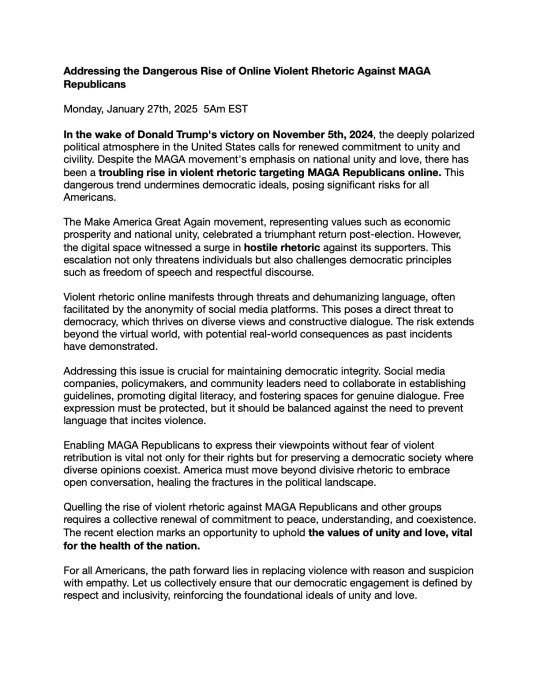
0 notes
Text
Cool, cool, cool, cool, cool... The Jewish Bund at Brandeis signed on to a letter advocating for homicide and justifying it as "resistance". They want the release of Elias Rodriguez because he did an "act of resistance" by murdering two people he perceived as Jews (there's no way he could have known they were Israeli or worked at the Israeli embassy or that Yaron was a Messianic) outside of a Jewish Museum that was hosting an event about peace and getting aid to Palestinians in Gaza.
It was a pointed hate crime meant to target Jews because in the rhetoric of this movement Jew = Zionist.
This why I don't trust Neo-Bundists. They're just tankies using the trappings and aesthetics of their Jewishness to justify antisemitism for a political agenda that would see them dead at the end. The original Bund naively believed they would be accepted by their goyische "allies" and were used to harm their fellow Jews. After they were done being exploited they were then tortured, imprisoned, and killed.
We've already seen the antisemites anti-Zionists turn on JVP for condemning the murder, what makes the Jewish Bund at Brandeis think it'll be any different for them? It's a repeat pattern.
May 27, 2025 Jewish Bund at Brandeis signs on to Unity of the Fields initiative to free Elias Rodriguez:

(Link to the full thing here - https://unityoffields.net/free-elias-rodriguez/)
This is part of what they signed:



#Jewish bund at Brandeis#gun violence#unity of the fields#jumblr#antisemitism#leftist antisemitism#Neo bundism#Neo bundist antisemitism#Neo bundists are just tankies#Tankies are inherently antisemitic because their rhetoric is laced with Soviet era antisemitism
54 notes
·
View notes
Text
Delving into Poetic Wisdom: A Review of "On the Art of Poetry" by Aristotle
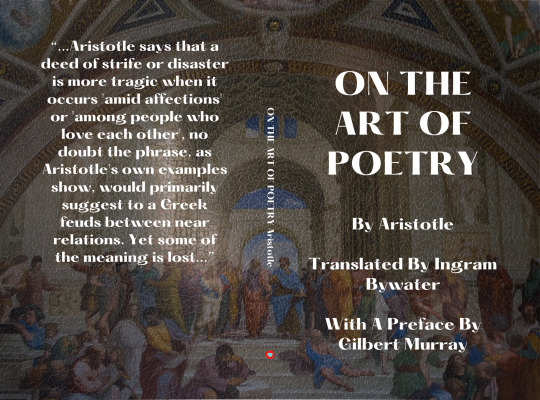
Aristotle's "On the Art of Poetry," translated by Ingram Bywater, stands as a seminal work in literary criticism, offering profound insights into the nature and function of poetry that continue to resonate with readers and scholars alike. Written in the 4th century BCE, this treatise serves as a comprehensive examination of the principles and techniques that underlie the creation of poetry, providing valuable guidance for poets and readers alike.
At its core, "On the Art of Poetry" is a testament to Aristotle's keen intellect and analytical prowess. In this work, Aristotle explores the various elements that contribute to the effectiveness of poetry, including plot, character, diction, and spectacle. Through his systematic analysis, Aristotle seeks to uncover the universal principles that govern the art of poetry, shedding light on its essential nature and its role in human society.
One of the most compelling aspects of "On the Art of Poetry" is Aristotle's emphasis on the importance of mimesis, or imitation, in poetry. According to Aristotle, poetry is a form of imitation that seeks to represent the actions, emotions, and experiences of human life. Through the skillful use of language and imagery, poets are able to create a vivid and lifelike portrayal of the world, inviting readers to engage with their work on a profound emotional and intellectual level.
Moreover, "On the Art of Poetry" offers valuable insights into the principles of dramatic structure and the role of catharsis in tragedy. Aristotle argues that tragedy is a form of poetry that evokes feelings of pity and fear in the audience, leading to a purgation or cleansing of these emotions. Through the depiction of the fall of a tragic hero, tragedy allows audiences to confront their own mortality and the fragility of human existence, ultimately leading to a deeper understanding of the human condition.
In addition to its exploration of tragedy, "On the Art of Poetry" also examines the principles of comedy and epic poetry, providing valuable guidance for poets working in these genres. Aristotle discusses the importance of unity of plot, character, and theme in epic poetry, as well as the role of humor and satire in comedy. Through his analysis, Aristotle highlights the diversity of poetic forms and the unique challenges and opportunities that each genre presents to the poet.
In conclusion, "On the Art of Poetry" by Aristotle is a timeless classic that continues to inspire and enlighten readers with its profound insights into the nature of poetry. Aristotle's systematic approach to literary criticism, coupled with his keen observations and analytical rigor, make this work an indispensable resource for anyone interested in the art of poetry. With its timeless wisdom and enduring relevance, "On the Art of Poetry" remains a cornerstone of literary theory and a testament to the enduring power of poetic expression.
Aristotle's "On the Art of Poetry," is available in Amazon in paperback 12.99$ and hardcover 18.99$ editions.
Number of pages: 116
Language: English
Rating: 10/10
Link of the book!
Review By: King's Cat
#Dramatic structure#Tragedy#Catharsis#Comedy#Epic poetry#Unity of plot#Characterization#Diction#Spectacle#Poetics#Aesthetic principles#Greek literature#Philosophical discourse#Aristotle's theory#Literary analysis#Poetic form#Emotion#Human experience#Morality#Ethics#Aesthetics#Universal principles#Literary genres#Rhetoric#Imagination
1 note
·
View note
Text
Trump's Presidency: An Altered Landscape of Expectations
In the realm of American politics, Donald Trump’s tenure as President ushered in a whirlwind of change, reshaping the expectations that surround the highest office in the land. The Straight Dope Show 279 delved into the profound impact of Trump’s approach to the presidency and the lasting impressions it left on future incumbents. Hosts dissected various aspects of Trump’s leadership, shedding…
View On WordPress
#American citizens#behavior#border wall#campaigning#dirt#division#divisive rhetoric#exclusion#Expectations#future presidents#hatred#Leadership#opposition parties#Perception#podcast conversation#policies#responsibilities#Trump&039;s presidency#unity
0 notes
Note
I’m kinda sad seeing egg culture turn into a weapon. I mean the whole egg thing already had some issues IMO (guessing people’s genders is … not great tbh, but I think the overall “haha yeah doing XYZ cracked my egg” is harmless fun). It was just a silly thing that wasn’t taken super seriously. And nowadays I’m seeing it weaponized, especially by transradfems. Seeing “which could mean nothing” and egg emoji and “checking back in a year teehee” and so on in tags of people’s posts… and always on the posts of gnc men, masc folks, enbies, etc. Hell, I’m transfem nonbinary, and comfortably so (I’m not a woman despite being on hrt, I use they/them, etc), but I’ll say things like “I put on a skirt and I felt so cute” and transfems that I know hang out in the vicinity of trf circles will post egg emojis and such. And when I say “hey. I’m nonbinary. Please stop.” They’ll just respond with “yeah that’s how we all start off lol” and only give half-apologies if other people speak up. It’s starting to feel like trfs only see their own identities as the true endpoint of being trans, and even as a transfem myself I feel so fucking erased and ignored and belittled by this.
Sorry idk if vent-adjacent stuff is allowed to be sent but. I guess with all the rancid toxic discourse and anti-transmasc stuff going on, I just wanted to point out another way that the radfem rhetoric “splash damage” is big and so many transfems that don’t fit their vision are being harmed as well by their words being used.
I hope you have a wonderful day. Trans unity forever and always.
.
523 notes
·
View notes
Text
Every few years there’s a shift in the discourse where someone decides that there’s a group of queers who aren’t “really” queer and for reasons unknown decided that they will focus all of their discourse on trying to discredit that one group.
It used to be “straight passing” bisexuals. Then it was “Theyfabs” and “transtrenders”. Then it was “hetero aces.” Now it’s “transmisogyny-exempt” people. And the thing you find every time is that the people writing angry multi-paragraph screeds about how these “invaders” are “stealing resources” or “silencing people” but they can never actually point to more than one or two examples, at best, of this happening.
But if you repeat something enough with a strong enough conviction in your voice, people will pretty much always be willing to think you’re right, even when you aren’t.
This is the basis of fascism. Exclusionary rhetoric is fascist. No one is immune to this thought process. You have to actively work on avoiding it.
“Did you just call me a fascist because I’m concerned with TME people silencing trans women” i mean, yeah. I did. Fix yourself, and I’ll be willing to talk to you again. I won’t apologize for what I said, mind you. But you can always fix yourself.
I used to think like that. I used to talk about how you “need dysphoria to be trans” and how bi people can “pass as straight” and how trans men “take up our space.” And I was wrong about all that.
There’s enough space in the queer community for everyone. We are always stronger when we understand this. Please, look towards unity rather than division. Fix yourselves.
Being wrong doesn’t make you a bad person. Changing your views is not evidence of weakness. Your friends will still live you if you change. Please.
2K notes
·
View notes
Text
Saying that "Transmisogyny is Misandry" is an act of epistemic violence. Stop it.
The following is a section of my essay The Question Has An Answer, entitled "The Measure of a Misandrist"
This is, ultimately, where most critiques of radical feminism go wrong, even when supposedly made with trans women’s vilification in mind. It is a too-popular idea that radical feminism was too harsh, too critical and too antagonistic towards men. After all—goes the reasoning—is not the fixation on trans women, the denial of our womanhood, and the maligning of us as ontologically predatory a consequence of their gender-absolutism? Is not resorting to ‘misandry’ in response to society’s misogyny also wrong?
Such arguments fail to be compelling for two reasons, the first of which should be obvious: transmisogyny is not misandry. The transmisogynist does not treat trans women the way she treats men, even if she refers to a trans woman as a man in the process of degendering her. Even if a transmisogynist bears an authentic antipathy for men, there is a crucial difference in how she regards trans women: namely, as an acceptable target of misogynistic degradation. Trans women’s bodies are dissected and scrutinized, our behavior pathologized and sexualized, and our own testimony discarded as unreliable, insubstantial, and immaterial. We are dehumanized, third-sexed, and branded permissible targets for ritualistic, collective, and sexualized punishment. A fate that even queer men tend to be spared.
Secondly and perhaps more importantly: the ‘misandry’ of the average transmisogynistic feminist is greatly overstated.
Trivially, we can note how the modern Gender-Conservative movement is full of men and the women who gleefully encourage their violence against trans people, a modern incarnation that bears the most threadbare of claims to any feminist tradition. They are, more than anything, a project concerned with the obfuscation of the term ‘feminist’, so that staunchly patriarchal ideologues can claim the label simply for promulgating transmisogynistic rhetoric. The face of modern transphobia is a far-flung cry from the academic lesbian feminists of yore, and is these days definitively male. Men abound at transphobic rallies, threaten to follow trans women into bathrooms to beat them, and call for the abolition of transition care in publications the world over.
Is such an answer evasive, though? Surely conservative men’s transmisogyny is a mainstream discursive force now, but was not the second wave chock-full of misandrist lesbian feminists aiming their ire at trans women? Can we not draw a line from their extremism to modern antifeminist backlash?
To get to the heart of that matter, we have to recall a little history.
April, 1973. The West Coast Lesbian Conference was, at that point, the largest gathering of lesbian feminists to date. Beth Elliot, a trans lesbian folk singer and feminist activist had been on the organizing committee for the event and was also scheduled to perform on opening night. Her fellow LA organizers had, in fact, insisted upon it.
When she took the stage at 9 p.m., she was accosted by two women, one of whom snatched the mic away to scream that Beth was a “transsexual” and a “rapist”, and demanded that she be ejected. In the ensuing chaos, a few organizers took the initiative to hold a vote (or, two, by some accounts), allowing the assembled audience to decide on Beth’s inclusion. The vote passed—by a slim majority, in some accounts, or by an overwhelming two-thirds majority, in some others—and so a visibly shaken Beth Elliot, with the support of her sisters, gave a short performance before promptly leaving.
Robin Morgan, who was scheduled to give a keynote speech on the theme of ‘unity’ the following day, spent the night editing her address. Rather than speaking for forty-five minutes, Morgan spent twice that time on a meandering screed “attacking everything in sight”, per Pat Buchanan—the conference organizers, women who work with men, and of course, transsexuals, blaming the continuing ills of patriarchy on a lack of feminist consciousness. Her caustic rhetoric shifted the entire tone and mood of the conference, forefronting the issue of biodestined womanhood. The Black Women’s Caucus, who had prepared a position paper on Black feminist organizing and the relevance of race to their struggle, are often omitted entirely from accounts of the conference, in large part due to Morgan’s troonmadness sucking up all the oxygen.
While some of the facts surrounding this incident are disputed, we know that Morgan’s invective was circulated amongst lesbian feminists, drawing attention to the topic of transsexual inclusion. Her charges that Beth Elliot was an “infiltrator” and “rapist” accrued sufficient cachet to get Beth blacklisted from feminist publications and music scenes. Despite a measure of personal support, Beth withdrew from the public eye, and Morgan’s bilious language found itself echoed in 1979’s Transsexual Empire, this time levied at Sandy Stone.
In some sense, Robin Morgan, Sister Raymond, and their ilk set the discursive tone on translesbophobia. While 1960’s Psycho attests that the idea of the deceptive, cross-dressing predator already held some sway in the cultural psychosexual imaginary, Morgan and Raymond—clumsily and soporifically—elevated that hateful trope to the status of “feminist concern”. They provided a framework and legitimacy to complement the sexologists’ pathologization of the “homosexual transsexual”, transmuting the cultural idea of the tranny from a pitiable, somewhat tragic figure, to a rapacious and monstrous one. Although coercion through deceptive seduction had always been core to the mythology of transsexuality, Morgan and Raymond enabled eradicationist sentiment towards trans women as a whole to be imbued with a certain feminist authority, recasting it as almost righteous.
We were, in the truest sense of the term, constructed, remade as biotechnological horrors seeking to traverse, fresh and bloody, from the scalpel to the women’s bathroom.
Given the centrality of that hastily-rewritten keynote speech to modern transmisogynistic propaganda, Morgan’s awareness of its discursive relevance is fascinating to witness. As Finn Enke notes in Collective Memory and the Transfeminist 1970s, when Morgan published her own account in 1977, her comments from the 1973 speech condemning the organizers for “inviting” Beth Elliot are omitted entirely. Morgan deliberately edited the speech to extend her critique of transsexuals and Beth Elliot specifically, dubbing them “gatecrashers” who sought to undermine and destroy the feminist movement from within. She consciously chose to erase Beth’s involvement in organizing the event, in addition to eliding that the majority of second-wave lesbian feminists present chose to defend and protect her.
Perhaps the most telling omission in subsequent accounts of this speech is an interesting detail about Morgan herself. Once she was done berating “women who work with men”, Morgan launched an impassioned defense of her husband. Before she derided Beth Elliot as a “male gatecrasher” with no place in lesbian feminism, Morgan advocated for her male husband’s place in lesbian feminism, on the grounds that he was a “feminist”, a “feminine man”, and—I still cannot help but marvel at this term whenever I encounter it—an “effeminist faggot”.
Seriously.
It is impossible to overstate just how utterly pathetic this pantomime of radicalism is. Morgan sublimated her own sexual and gendered anxieties into unrestrained transmisogyny, as many people often do, seeking to secure her own place as a lesbian by defining her legitimacy against the seeming illegitimacy of an “outsider”. Her arguments for doing so hinged on staining transsexual womanhood with the original sin of reproducing manhood, even as she pleaded the case that her husband, through his proximity to the feminine, had successfully absolved his own! Morgan’s audacity and insecurity drips off the page, revealing her charade to be nothing more than a performative, incoherent, inconsistent, bigoted farce.
Additionally, this revelation demonstrates how even here, in the holy of holies, at the epicenter of lesbian-feminist transmisogyny, misandry could hardly be claimed as a motivation. Beth Elliot was condemned for her transsexuality. Her putative ‘manhood’ was invoked only to degender and dehumanize her, while the avowed transmisogynist slurring her asked for the inclusion of men in the same breath!
Nor should we discount those who stood by Beth Elliot and Sandy Stone, even if their efforts were ignored, silenced, and erased. Enke’s paper meditates on a photograph of Beth on stage, framed to depict her alone, isolated, besieged. The woman holding Beth’s hand is left just out of the picture.
Meanwhile, for all their condemnation of trans lesbians’ “male energy”, the transmisogynists who so revile trans women’s “manhood” had no compunctions when it came to allying with the “male institutions” that have surveilled us, vilified us, marginalized us, and tried to erase our very stories, our connections, our sisterhood from history. Even the scraps that remain cannot escape reframing, rewriting, revisionism that insists: you were always unwanted, and stood apart.
Except when we weren’t, and didn’t.
#transfeminism#materialist feminism#gender is a regime#social constructionism#feminism#sex is a social construct#lesbian feminism#third sexing#degendering#stop saying 'transmisogyny is misandry'#you are literally doing the thing and decentering trans women in discussions of our own oppression
900 notes
·
View notes
Quote
There is one issue now, and only one: keeping alive the vestiges of American democracy, with its commitment to meaningful checks and balances and to individual rights as well as majoritarian rule. American democracy has never been perfect, but it’s all we’ve got. When we have it, we can disagree peacefully and hope to remedy policy mistakes through discussion, legal action, and the ballot box. If we lose it, we’re done. So, whether you’re a fan of Bernie Sanders and the Squad or an admirer of Liz Cheney, we all need to stand together against Trump. To have any hope of achieving the kind of disciplined unity that will be essential to countering Trump, we also need a rhetoric and politics of inclusion. The left needs to ease up on cancel culture, rigid purity tests, and petty identity politics. We can’t give up on one another, and we can’t waste time wallowing in self-pity, or make plans to emigrate to Canada. This is our country. Around the world, millions of brave people have pushed back against far more abusive and frightening leaders than Donald Trump. If they can stand up against truly horrific regimes in their own countries, Americans can handle Trump.
I Helped Run “War Games” on Trump’s Plans. They Were Not Reassuring.
519 notes
·
View notes
Text

This is a take I've seen fairly often- that trans men & mascs only think they experience transandrophobia because they refuse to accept that what they're experiencing is misogyny.
It's also a completely ridiculous take. The fact that trans men/mascs are targeted by misogyny is a fundamental part of transandrophobia theory. Trans men/mascs, and others who regularly discuss transandrophobia, emphasize over and over again the ways in which trans men/mascs experience misogyny. For example, the idea that they are women and therefore are too stupid and brainwashed to be trusted about their genders, or the sense of entitlement to trans men/mascs' bodies (how dare you ruin your perfect breasts, how dare you transition in a way that makes you unable to carry children, how dare you not be the beautiful woman i want you to be).
In fact, the people who deny that trans men/mascs experience misogyny tend to be the same people who argue against the concept of transandrophobia. They insist that trans men receive male privilege, and in fact actually benefit from misogyny rather than suffer from it.
When trans men/mascs point the ways that they are affected by misogyny, they are accused of spreading TERF rhetoric (as though acknowledging the ways in which people who were assigned female at birth are oppressed automatically means you believe in "sex consciousness" and "afab unity" against anyone assigned male at birth"), or accused of implying that trans women aren't affected by misogyny (they absolutely are, the belief that trans men and women can't both be affected by misogyny stems from oppositional sexism)
All this to say: The people who talk about transandrophobia are well aware that trans men/mascs suffer from misogyny, and aren't denying this out of dysphoria or internalized misogyny- they aren't denying this at all. The people who deny that trans men/mascs suffer from misogyny are the people who believe transandrophobia doesn't exist.
And, transandrophobia isn't "just misogyny." Misogyny is a crucial component of transandrophobia- again, no one who talkes about transandrophobia is denying this- but not the only component.
Trans men/mascs being denied access to gynecological healthcare (that cis women are able to access) because they appear to be men, or have their gender legally changed to male isn't "just misogyny."
Trans men/mascs to losing their friends, support, and abuse and mental health resources when they come out and transition, or reach a point of being "too masculine," isn't "just misogyny".
The belief that going on testosterone will make trans men/mascs dangerous and violent, and the negative rhetoric about bottom surgery, isn't "just misogyny."
Being called a gender traitor and accused siding with the enemy and only transitioning to gain male privilege isn't "just misogyny."
Trans men/mascs being impregnated specifically as a method of forcing them to detransition isn't "just misogyny."
Choosing to use a women's bathroom (either due to safety concerns or transphobic laws) and being kicked out or assaulted for looking male isn't "just misogyny."
Trans men/mascs getting violently attacked because "if you want to be a man so bad, I'll beat you up like one" isn't "just misogyny."
People who talk about transandrophobia very much recognize that trans men/mascs experience misogyny (and are trying to get people who deny transandrophobia to recognize this as well), and there are aspects of transandrophobia that go beyond "just misogyny." Neither of these things contradict each other. In conclusion, "'transandrophobia' is just misogyny but transmascs don't want to admit it" is completely false all around, so I wish it wasn't such a commonly held belief.
#transandrophobia#anti-transmasculinity#looking for sources just ended up taking a toll on my mental health so i decided not to link 'proof' for the examples of transandrophobia#if you're curious about a specific one and ask in good faith i might provide something though#anyway. you ever see such a garbage take you have to write an entire tumblr post about it
682 notes
·
View notes
Text
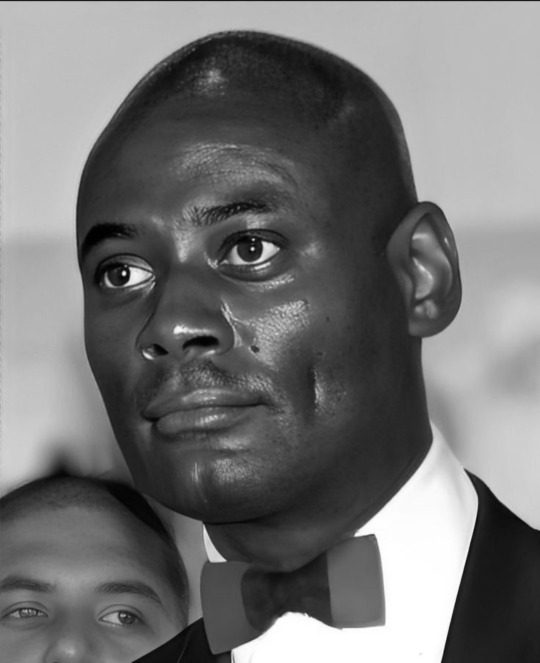
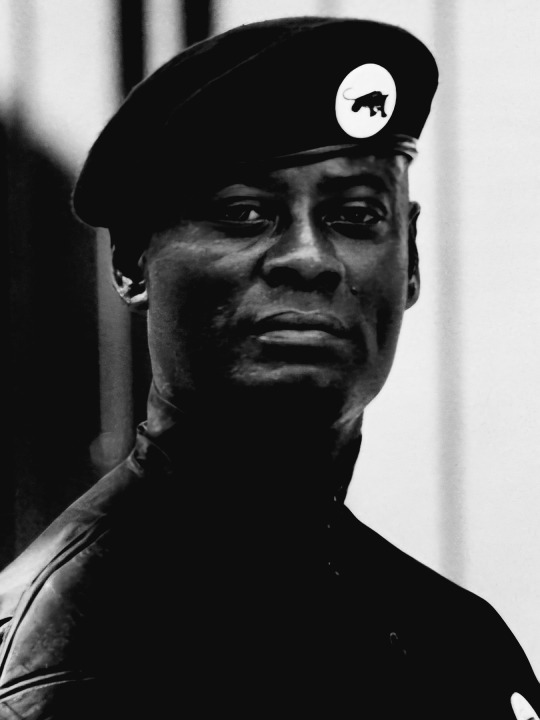
Brother Khalid Abdul Muhammad (1948–2001) was a prominent African-American activist and orator known for his unapologetic views on race and social justice. He was a fiery speaker and a great figure in the fight against systemic racism and oppression.
Khalid Muhammad was born Harold Moore Jr. in Houston, Texas. He attended Dillard University in New Orleans, where he studied theology. Later, he furthered his studies at Pepperdine University in California. It was during his college years that he became involved with the Nation of Islam (NOI).
Khalid Muhammad rose to prominence within the Nation of Islam as a minister and a top aide to Louis Farrakhan. He became the National Spokesman for the NOI and was known for his powerful speeches advocating black empowerment, self-reliance, and resistance against white supremacy. However, his incendiary remarks, particularly in a 1993 speech at Kean College, led to his suspension from the Nation of Islam.
After leaving the NOI, Khalid Muhammad became active in the New Black Panther Party (NBPP), an organization that claims ideological lineage to the original Black Panther Party but with distinct differences such as being more pan african centred. He became the group's chairman in 1998, using his leadership to expand its platform of black empowerment and militant resistance to racial injustice.
The NBPP, under Khalid Muhammad's leadership, was known for its radical and militant stance. It advocated for black self-defense, reparations for slavery, and independence from systemic oppression. Critics, including members of the original Black Panther Party, accused the NBPP of distorting the original Panthers' legacy and focusing more on confrontational rhetoric.
Khalid Muhammad's speeches often emphasized black pride, self-determination, and unity. Khalid Muhammad supporters viewed him as a fearless advocate for the black community. His death in 2001 from a brain "aneurysm" marked the end of a contentious but impactful career in activism.
#black people#black#black history#black tumblr#blacktumblr#pan africanism#black conscious#africa#black power#black empowering#khalid muhammad#black leader#new black panther party#nation of islam#african american
332 notes
·
View notes
Note
hey, so ill leave this on anon for now but im down for messaging if you want, but the actual reason why people are having a "discourse" about the transandrophobia is due to it mainly used to attack and leverage privilege against trans women like us. it stems specifically from Mens Rights Activists, literally so, and the majority of its rhetoric attempts to deny transmisogony and deny trans men having any privileges over trans women. That isnt to say that trans men dont suffer transmisogony or suffer any unique transphobia, but that not only is the term rooted in MRA contexts but is also rooted in deeply transmisogonystic historical medical contexts.
A lot of the "theory" expounded from the transmasc community simply just play off "vibes" and reactionary situations, recounting times where someone mistook them for a trans woman and saying that was someone being a misandrist against them. Mostly they get into arguments with/harrass trans women for trying to explain how theyre being misogynistic and actively hurting the trans and queer community. They talk a lot about "trans unity" when in reality theyre just talking about how they benefit from trans women feeling bad and not speaking up for themselves and want us to continue doing that
Men who talk about transandrophobia aren't saying they are oppressed because someone mistook them for a woman. What they're saying is that trans men/mascs face unique oppression that is exclusive to trans men/mascs. For example, forced pregnancy to prevent transition and FGM.
Typically trans women/fems don't have to worry about their reproductive rights being stripped, or being forced to carry a child to prevent transition.
Lot more than vibes going on here.
Also, if the term really makes you that uncomfortable, just call it transmisandry or whatever. Trans guys aren't gonna care what you call it so long as you don't try to correct them on which word they choose, and don't talk over them.
380 notes
·
View notes